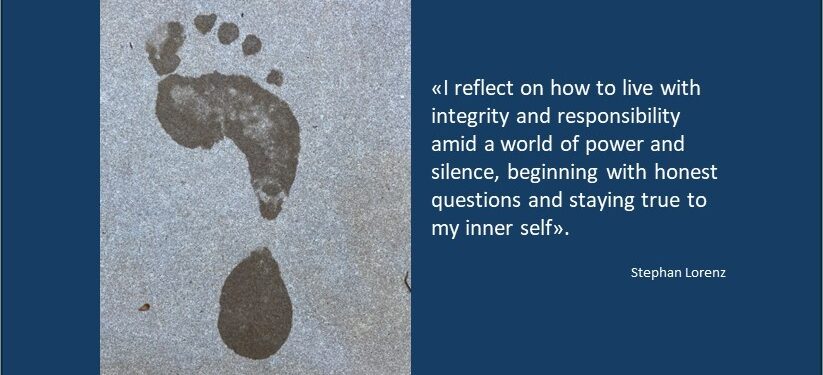I take a step back. In the silence, what is lost in the noise becomes visible. Thoughts arise about being human, about responsibility, about what we do to one another. And about the quiet question: How do we truly want to live?
One question kept sticking with me: Why is war necessary? Why do we keep waging it on battlefields, in politics, in our families, within ourselves?
I see how economic interests, power games, and national pride shape decisions whose consequences are often written in blood and tears.
And I ask myself: Is this really necessary? Or just habit? Calculated? Inevitable?
I see political decisions where the loss of human life seems factored in, as if the suffering of others is an acceptable price for a goal someone declared “greater.” I ask myself: Who gives whom the right to decide that? And where, in this cold calculation, is the human being? Where is compassion, respect for life, dignity?
Power (➜ emotionally driven, not value-based) seems to be a force running through all systems. Maybe we don’t need it. Maybe we just want it. Because it promises control. The illusion of safety. Influence.
But at what cost? Because power is not neutral. It distributes opportunities unequally. While some countries and people benefit, others are left behind in poverty, in the shadows, without a voice.
And then I reflect on my work as a coach. I help people, strengthen them, empower them, give them space and perspective. But sometimes I wonder: How does that align with a world in which, at the same time, we harm others through our systems, our consumption, our silence? Can I truly empower without destroying elsewhere? Where does my responsibility begin and where does it end?
I feel a deep longing within me for respect, dignity, justice, and love. Not as concepts, but as a way of being. But sometimes, they seem hidden, in the noise of the world, in the speed with which we make decisions that estrange us from ourselves.
We know what’s not right. And still, we risk doing it anyway. Why?
Because recognizing the issue is simple, changing it is not. Because comfort can be stronger than conviction. Because the system we’ve built often doesn’t reflect what we actually believe or wish for.
Is there a real path to peace?
For everyone? For every culture, every faith, every identity?
I keep wondering. But I believe: It doesn’t begin with institutions or ideologies. It begins within me. In how I listen. In how I accompany others. In how I question where I may have become blind.
And I ask myself: How can I be an authentic coach in this world?
How can I guide without overlooking? Challenge without hurting?
I believe: by continually asking myself whether I am still being true. Whether my actions align with my values. Whether I know my own shadows. And by finding the courage to not sell my integrity, not for success, not for recognition, not for comfort.
I’m beginning to understand more and more how much our decisions, judgments, and reactions depend on context. Nothing stands on its own. What seems right in one moment can be destructive in another. What is considered strength can become harshness in the wrong setting. Even sympathy, if it clings or wants to rescue, can hurt.
Context-awareness means practicing humility. Not rushing to judgment. Instead, asking: What is influencing my thinking right now? What story does the other carry? What structures are at play in the background? It means pausing before acting. And bearing the complexity without rushing toward easy answers.
In coaching, as in life, I cannot operate disconnected from systems, relationships, and internal imprints. I do not guide isolated individuals, but people within contexts. And I, too, am not entirely neutral. My perspective is always part of the reality I help shape.
This awareness challenges me. And at the same time, it sharpens my senses for what lies between the lines. For what is not said, but resonates underneath.
Maybe this is what integrity means: Not blind loyalty to principles, but the ability to honestly reassess one’s stance in each new context and consciously choose what is truly authentic in the moment.
And then I think of the child within me. Of wonder, play, unconditional trust. Of the open gaze that doesn’t immediately judge, that doesn’t seek to control, but simply wants to experience.
I believe we lose something essential when we forget how to be a child.
When we mistake harshness for maturity and sacrifice lightheartedness to functionality.
Being a child is not a state we outgrow. It’s an inner space, alive, sensitive, real. That is where love resides. That’s where curiosity, compassion, unfiltered presence live. When I lose that space, I lose myself. Then my vision narrows, my heart grows heavy, my world becomes small.
Maybe that is the way back: Not just to learn, but to remember. Who we once were. How we loved. How we existed without masks. The child in me is not naive, it is alive. It shows me what truly matters: To feel. To trust. To be connected. That is life. That is love.
There is no simple answer. But for me, there is a clear decision: Not to delegate my responsibility. Not to hide my stance. Not to lose my inner child. And not to close my heart, even when the world seems harsh, contradictory, or dark.
Maybe that is the first step. Not a loud one. But a true one.
Best regards
Stephan





